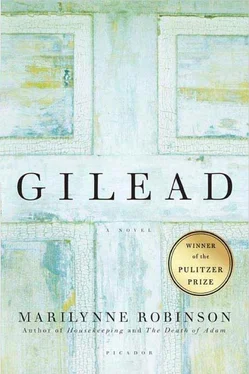The President, General Grant, once called Iowa the shining star of radicalism. But what is left here in Iowa? What is left here in Gilead? Dust. Dust and ashes. Scripture says the people perish, and they certainly do. It is remarkable. For all this His anger is not turned away, but His Hand is stretched out still. The Lord bless you and keep you, etc.
Only a few people seemed to have been paying attention. Those who did came very near taking offense at the notion that they were perishing even though the terrible drought had begun to set in that would bankrupt and scatter so many families, even whole towns. There was a little laughter of the kind you hear when the outlandishness of a thing is being generally agreed on. But that was the worst of it. My grandfather stood there on the stage in his buzzard-black preacher’s clothes, eyeing the crowd with the dispassionate intensity of death itself, with the banners flying around him. Then the band struck up, and my father went to him and put his hand on his left shoulder, and brought him down to us. My mother said, “Thank you, Reverend,” and my grandfather shook his head and said, “I doubt it did much good.”
I have thought about that very often — how the times change, and the same words that carry a good many people into the howling wilderness in one generation are irksome or meaningless in the next. You might think I am under some sort of obligation to try to “save” young Boughton, that by inquiring into these things he is putting me under that obligation. Well, I have had a certain amount of experience with skepticism and the conversation it generates, and there is an inevitable futility in it. It is even destructive. Young people from my own flock have come home with a copy of La Nausee or L’Immoraliste , flummoxed by the possibility of unbelief, when I must have told them a thousand times that unbelief is possible. And they are attracted to it by the very books that tell them what a misery it is. And they want me to defend religion, and they want me to give them “proofs.” I just won’t do it. It only confirms them in their skepticism. Because nothing true can be said about God from a posture of defense.
From the time my father began receiving those long letters from Germany, he began watching me more, or otherwise, than he ever had before. For the first time in my life we were not quite at ease with each other, my father and I. I had to be careful what I said to him, because he would note any possible tinge of heterodoxy and lecture me solemnly on the nature of the error my thinking might have brought me to. Even days later he would come to me with new refutations of. things I had not said. No doubt he was speaking to Edward; certainly he was speaking to me as, so it must have seemed, the next Edward. Then, too, he was clearly rehearsing for his own sake the defenses he could make of his beliefs. They had never till that moment struck me as vulnerable, nor him, I suspect.
Then, when he began reading those books I brought home, it was almost as if he wanted to be persuaded by them, and as if any criticism I made of them was nothing more than recalcitrance. He used phrases like “forward-looking.” You’d have thought a bad argument could be put beyond question by its supposed novelty, for heaven’s sake. And a lot of the newness of this new thinking was as old as Lucretius, which he knew as well as I did. In that letter he sent me which I burned he spoke of “the courage required to embrace the truth.” I never forgot those words because of the way they irritated me. He just assumed that his side of the question was “the truth” and only cowardice could be preventing me from admitting as much. All that time, though, I think he was just finding his way to Edward, and I can’t really blame him for it. He did try to take me along with him.
***
In the matter of belief, I have always found that defenses have the same irrelevance about them as the criticisms they are meant to answer. I think the attempt to defend belief can unsettle it, in fact, because there is always an inadequacy in argument about ultimate things. We participate in Being without remainder. No breath, no thought, no wart or whisker, is not as sunk in Being as it could be. And yet no one can say what Being is. If you describe what a thought and a whisker have in common, and a typhoon and a rise in the stock market, excluding “existence,” which merely restates the fact that they have a place on our list of known and nameable things (and which would yield as insight: being equals existence!), you would have accomplished a wonderful thing, still too partial in an infinite degree to have any meaning, however.
I’ve lost my point. It was to the effect that you can assert the existence of something;—Being — having not the slightest notion of what it is. Then God is at a greater remove altogether if God is the Author of Existence, what can it mean to say God exists? There’s a problem in vocabulary. He would have to have had a character before existence which the poverty of our understanding can only call existence. That is clearly a source of confusion. Another term would be needed to describe a state or quality of which we can have no experience whatever, to which existence as we know it can bear only the slightest likeness or affinity. So creating proofs from experience of any sort is like building a ladder to the moon. It seems that it should be possible, until you stop to consider the nature of the problem.
So my advice is this — don’t look for proofs. Don’t bother with them at all. They are never sufficient to the question, and they’re always a little impertinent, I think, because they claim for God a place within our conceptual grasp. And they will likely sound wrong to you even if you convince someone else with them. That is very unsettling over the long term. “Let your works so shine before men,” etc. It was Coleridge who said Christianity is a life, not a doctrine, words to that effect. I’m not saying never doubt or question. The Lord gave you a mind so that you would make honest use of it. I’m saying you must be sure that the doubts and questions are your own, not, so to speak, the mustache and walking stick that happen to be the fashion of any particular moment.
No sleep this night. My heart is greatly disquieted. It is a strange thing to feel illness and grief in the same organ. There is no telling one from the other. My custom has always been to ponder grief; that is, to follow it through ventricle and aorta to find out its lurking places. That old weight in the chest, telling me there is something I must dwell on, because I know more than I know and must learn it from myself — that same good weight worries me these days.
But the fact is, I have never found another way to be as honest with myself as I can be by consulting with these miseries of mine, these accusers and rebukers, God bless them all.
So long as they do not kill me outright. I do hope to die with a quiet heart. I know that may not be realistic.
Well, I close my eyes and I see Jack Boughton, and it seems to me that more than he has matured or aged he has wearied. And I think, Why must I always defend myself against this sad old youth? What is the harm I fear from him?
Well, that really is not a purely rhetorical question. This morning your mother gave me a note from him. It said, “I am very sorry that I offended you yesterday. I will not trouble you again.” He writes a good hand. In any case, I felt from her manner that your mother knew what lay behind the note. It was just a folded slip of paper, but she would never have read it if he had not shown it to her. Perhaps he told her what it said. Or simply that it was an apology. I heard them talking on the porch before she brought it in to me. She looked sorry and concerned for me, for him perhaps, or for both of us. They do talk, I know that. Not much and not often. But I sense a kind of understanding between them.
Читать дальше












